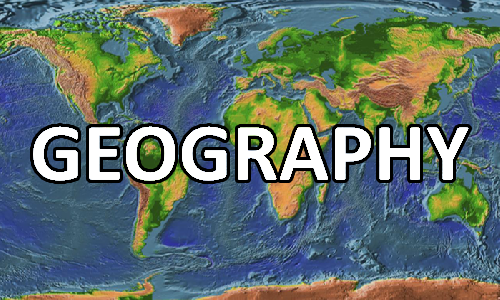Curriculum Intent - GeographyThe Geography curriculum supports our schools aims of enabling students to become ‘Successful learners, confident individuals and responsible citizens’. Students will develop the Geographical knowledge, understanding and skills to provide the framework and approaches that explain how the Earth's significant features and places, at different scales, are interconnected and change over time. The curriculum is underpinned by Key Concepts including human and physical processes, interdependence and scale. The work builds upon previous learning and aims to inspire a curiosity and consolidate and extend their skills and knowledge of physical & human geography but also enable our students to be confident and inquire about the world around them. The Geography curriculum will equip students with the skills and understanding ready for study of geography at Key Stage 4. This is supported through studying environmental issues such as climate change and linking topics to sustainable development facilitating them to expand their understanding of what it means to be a ‘global citizen’. We want children to enjoy and love learning about geography by gaining this knowledge and skills, not just through experiences in the classroom, but also with the use of fieldwork and educational visits.
|
Implementation
In ensuring high standards of teaching and learning in geography, we implement a curriculum that is progressive throughout the whole school. Geography is taught as part of a termly topic, focusing on knowledge and skills stated in the National Curriculum. We ensure that geography has the same importance given to it as the core subjects, as we feel this is important in enabling all children to gain ‘real-life’ experiences. For example, using the local area to follow maps in Key Stage 2 as well as comparing the similarities and differences in environments and communities through to debating world issues such as the positive and negative impact of tourism in Key Stage 3.
Impact
The impact and measure of this is to ensure that children are equipped with geographical skills and knowledge that will enable them to be ready for the curriculum at Key Stage 4 and for life as an adult in the wider world. We want the children to have thoroughly enjoyed learning about geography, therefore encouraging them to undertake new life experiences now and in the future. We recognise that literacy and communication cover a variety of skills, including taking and making notes, summarising information, presenting ideas, title writing, persuasive writing and arguments. It also covers the ‘spoken language’ component of the national curriculum. Numeracy is also promoted through data analysis and graph drawing through to the use of digital mapping. We encourage students to question data presented to them by identifying trends and anomalies and using this to present their arguments. Working as a Geographer requires a set of skills that are supported by literacy and numeracy and we aim to support the pupil’s journey through the school empowering them to access resources and support to develop their skills and increase their resilience. This forms the essential backbone of what being a Geographer is: an idea is developed and then rigorously examined to provide evidence upon which an objective opinion can be formed as to whether the original idea has changed.
In ensuring high standards of teaching and learning in geography, we implement a curriculum that is progressive throughout the whole school. Geography is taught as part of a termly topic, focusing on knowledge and skills stated in the National Curriculum. We ensure that geography has the same importance given to it as the core subjects, as we feel this is important in enabling all children to gain ‘real-life’ experiences. For example, using the local area to follow maps in Key Stage 2 as well as comparing the similarities and differences in environments and communities through to debating world issues such as the positive and negative impact of tourism in Key Stage 3.
Impact
The impact and measure of this is to ensure that children are equipped with geographical skills and knowledge that will enable them to be ready for the curriculum at Key Stage 4 and for life as an adult in the wider world. We want the children to have thoroughly enjoyed learning about geography, therefore encouraging them to undertake new life experiences now and in the future. We recognise that literacy and communication cover a variety of skills, including taking and making notes, summarising information, presenting ideas, title writing, persuasive writing and arguments. It also covers the ‘spoken language’ component of the national curriculum. Numeracy is also promoted through data analysis and graph drawing through to the use of digital mapping. We encourage students to question data presented to them by identifying trends and anomalies and using this to present their arguments. Working as a Geographer requires a set of skills that are supported by literacy and numeracy and we aim to support the pupil’s journey through the school empowering them to access resources and support to develop their skills and increase their resilience. This forms the essential backbone of what being a Geographer is: an idea is developed and then rigorously examined to provide evidence upon which an objective opinion can be formed as to whether the original idea has changed.



